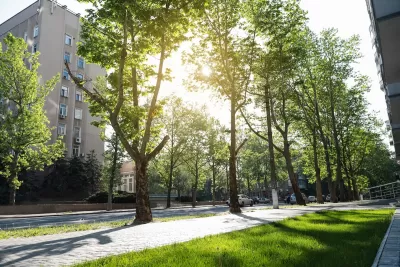Cal Poly, in partnership with Cal Fire, is leading the development of California’s new Strategic Plan for Urban Forestry, combining advanced data tools and interdisciplinary collaboration to expand tree canopy cover.

Cal Poly has been awarded a contract to develop California’s new Strategic Plan for Urban Forestry, in collaboration with Cal Fire and driven by Assembly Bill 2251. As reported by Emily Slater, this ambitious initiative aims to increase statewide tree canopy cover by 10% by 2035, addressing climate change, improving air quality, and fostering equity in green space access. The project, led by Cal Poly’s Urban Forest Ecosystems Institute (UFEI) and spearheaded by biological sciences professor Jenn Yost, leverages cutting-edge data and tools like SelecTree to guide urban forestry management. The plan focuses on expanding canopy cover in disadvantaged communities most affected by extreme heat and limited access to shade.
UFEI’s expertise in urban forestry, backed by advanced neural network-powered mapping techniques that have identified 40 million trees statewide, will inform policies and strategies to ensure equitable distribution of urban forest benefits. The strategic plan emphasizes resilience through biodiversity, actionable goals for cities, and stakeholder engagement to maximize community impact. According to UFEI director Matt Ritter, addressing California’s status as the most urbanized state with the lowest per capita canopy cover is critical to reversing environmental disparities and preparing for climate challenges.
This yearlong effort involves coordination with tribal nations, nonprofits, local governments, and tree professionals to create a comprehensive and inclusive plan. By June 2025, the final roadmap will be delivered to the state legislature, offering data-driven strategies to promote canopy growth and enhance urban forest resilience. Through interdisciplinary collaboration, Cal Poly is poised to deliver transformative solutions to improve urban ecosystems and foster thriving, equitable communities across California.
FULL STORY: Cal Poly to Lead Development of California’s New Urban Forestry Strategic Plan

Planetizen Federal Action Tracker
A weekly monitor of how Trump’s orders and actions are impacting planners and planning in America.

Map: Where Senate Republicans Want to Sell Your Public Lands
For public land advocates, the Senate Republicans’ proposal to sell millions of acres of public land in the West is “the biggest fight of their careers.”

Restaurant Patios Were a Pandemic Win — Why Were They so Hard to Keep?
Social distancing requirements and changes in travel patterns prompted cities to pilot new uses for street and sidewalk space. Then it got complicated.

Platform Pilsner: Vancouver Transit Agency Releases... a Beer?
TransLink will receive a portion of every sale of the four-pack.

Toronto Weighs Cheaper Transit, Parking Hikes for Major Events
Special event rates would take effect during large festivals, sports games and concerts to ‘discourage driving, manage congestion and free up space for transit.”

Berlin to Consider Car-Free Zone Larger Than Manhattan
The area bound by the 22-mile Ringbahn would still allow 12 uses of a private automobile per year per person, and several other exemptions.
Urban Design for Planners 1: Software Tools
This six-course series explores essential urban design concepts using open source software and equips planners with the tools they need to participate fully in the urban design process.
Planning for Universal Design
Learn the tools for implementing Universal Design in planning regulations.
Heyer Gruel & Associates PA
JM Goldson LLC
Custer County Colorado
City of Camden Redevelopment Agency
City of Astoria
Transportation Research & Education Center (TREC) at Portland State University
Camden Redevelopment Agency
City of Claremont
Municipality of Princeton (NJ)





























